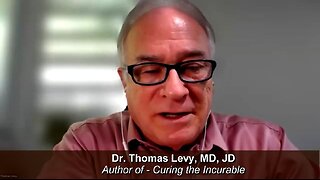Premium Only Content

Can we Eliminate Surgical Pain Without Addicting Patients?
Barry Friedberg, Pioneer of Brain Monitored, Goldilocks anesthesia
https://goldilocksfoundation.org/
It must have been terrifying for humanity up until the 1600s to have little more than opium or willowbark to relieve severe pain. From that century up to the 1800s, the blessings of sedation via chloroform and ether lessened the terror for the growing field of surgery. It wasn’t until the late 1800s, though, when ether allowed anesthesia to really prevent pain during operations.
In the 1900s patients had it better with heroin and morphine, but their addiction potential led in the 1960s to the professionalization of the Pain Management field. Medicating the brain - as anesthesia does - has risks (including death or postoperative cognitive disorder) that has leading doctors and scientists struggling to find the right amount of medication - the Goldilocks principle - to enable pain-free surgery without putting patients at risk.
The only way to get not 'too much,' not 'too little' but 'just the right amount' of anesthesia for your brain is to directly measure it's response. Brain activity monitors evaluate individual patient brain responses, eliminating the practice of routine anesthesia over-medication. Older patients, especially those with other medical problems, are vulnerable to anesthesia risks. Seventy million Baby Boomers are entering their 'Golden' years. As 10% of them will have surgery every year, they pose a substantial potential postoperative problem for their families and the health care system.
Americans must become their own patient safety advocates. Americans must insist on brain monitoring with anesthesia. Dr. Friedberg will explain if no brain monitoring is available at the facility where your surgery is planned, calmly explain to your surgeon (or administrator or anesthesia provider) that you will seek another one where this type of monitoring will be done. Monitoring virtually eliminates the need for postoperative opioid pain relief along with the risk of postoperative opioid addiction.
Be sure to check out our upcoming Guests: https://www.your-mp.com/webinars
Connect with ALL our past Guests: https://www.your-mp.com/continuing-the-conversation
-
 1:11:36
1:11:36
Health Biz and Politics
2 months agoALL Disease Mitigated by Vitamin C
2491 -
 9:15:09
9:15:09
BrancoFXDC
11 hours ago $8.93 earnedHAPPY NEW YEARS - Road to Platinum - Ranked Warzone
92.7K4 -
 5:53
5:53
SLS - Street League Skateboarding
5 days agoBraden Hoban’s San Diego Roots & Hometown Win | Kona Big Wave “Beyond The Ride” Part 2
99.9K13 -
 6:03:57
6:03:57
TheBedBug
16 hours ago🔴 LIVE: EPIC CROSSOVER - PATH OF EXILE 2 x MARVEL RIVALS
100K9 -
 1:12:45
1:12:45
The Quartering
14 hours agoTerror In New Orleans, Attacker Unmasked, Tesla BLOWS UP At Trump Tower! Are We Under Attack?
163K261 -
 1:32:08
1:32:08
Robert Gouveia
15 hours agoNew Year TERROR; Trump Speaks at Mar-a-Lago; Speaker Johnson FIGHT
134K112 -
 22:21
22:21
Russell Brand
1 day agoVaccines Don't Cause Autism*
204K882 -
 2:05:27
2:05:27
The Dilley Show
15 hours ago $26.74 earnedNew Years Agenda, New Orleans Terror Attack and More! w/Author Brenden Dilley 01/01/2025
119K39 -
 25:45
25:45
Outdoor Boys
3 days ago3 Days in Arctic Survival Shelter - Solo Bushcraft Camping & Blacksmithing
86.4K27 -
 2:59:05
2:59:05
Wendy Bell Radio
22 hours agoAmerica Is Back
132K138